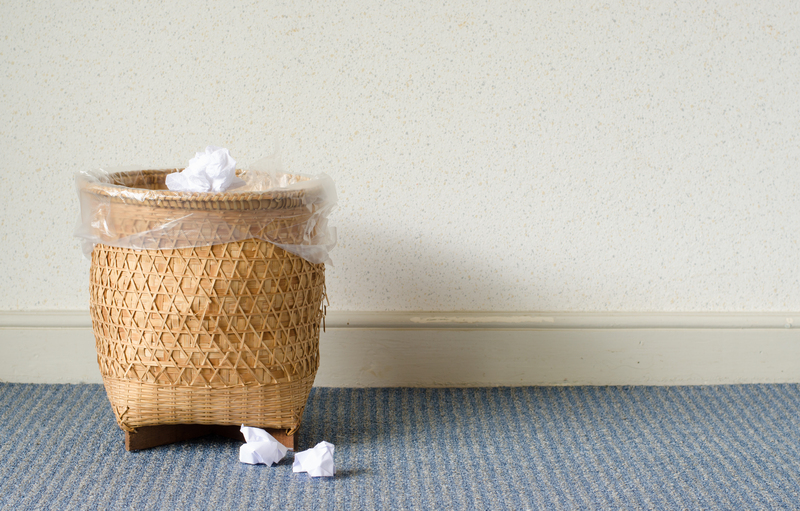Revolutionize How You Recycle at Work: A Modern Guide
Recycling at work isn't just a buzzword--it's a pathway to a cleaner planet, enhanced corporate reputation, and even cost savings. Yet, most offices still relegate recycling to a dusty bin under the copier. The time has come to revolutionize workplace recycling, turning it from an afterthought to a driving force for sustainability and innovation. In this guide, we'll unpack comprehensive strategies, creative ideas, and actionable steps to boost recycling at your business. Whether you're a startup, large company, or non-profit, this article will help you transform your approach to recycling at work and inspire your colleagues to join the movement.

Why Recycling at Work Matters More Than Ever
The average office can generate up to two pounds of waste per employee per day, a significant chunk of which--like paper, cardboard, and plastics--could be recycled. Implementing effective recycling programs at work:
- Reduces your organization's carbon footprint
- Cuts disposal costs and even generates revenue from recyclables
- Enhances employee morale and engagement
- Boosts your brand's public image and attracts sustainability-minded clients
- Aligns your business with local and national regulations on waste management
Companies that revolutionize how they recycle in the office play a crucial role in achieving larger environmental goals and establishing themselves as industry leaders in responsible business practices.
Innovative Steps to Revolutionize Workplace Recycling
1. Audit, Analyze, and Assess Waste Streams
Before you upgrade your recycling program, get a clear snapshot of your current waste generation. Conduct a waste audit--analyzing what types and how much waste is produced. Categorize by:
- Paper and cardboard
- Plastics (bottles, wraps, containers)
- Metals (cans, staples)
- Glass (if applicable)
- Organic waste (food scraps, coffee grounds)
- E-waste (batteries, electronics)
This data-driven approach to recycling at work helps set tangible targets, allocate resources, and identify key problem areas.
2. Make Recycling at the Office Effortless
Too often, office recycling bins are inconveniently placed or poorly labeled, leading to wishful "recycling" and contamination. Revolutionize office recycling by:
- Positioning recycling stations at central, high-traffic areas like break rooms, entrances/exits, and near printers
- Using color-coded bins and clear signage for plastics, paper, glass, metals, and landfill waste
- Providing easy-to-understand instructions above or on bins, including what goes where with images
Consider smart bins: internet-connected containers that notify facilities teams when they're full and even track contamination in real-time.
3. Engage Employees with Creative Recycling Campaigns
Leadership alone can't revolutionize workplace recycling--it takes buy-in from every staff member. Supercharge participation through:
- Competitions: Run team or department challenges. Who recycles the most per month? Offer eco-friendly rewards.
- Lunch & Learns: Host short sessions on the impact of recycling at work, featuring inspiring guest speakers.
- Gamification: Use apps or leaderboards to track individual or team recycling rates.
- Visual reminders: Place posters or digital screens with real-time impact stats (e.g., "You've saved 500 trees this quarter!").
Give your recycling initiative a name and brand identity--like "GreenWorks" or "EcoOffice"--to foster a sense of ownership.
4. Expand What You Recycle at the Office
Think beyond bottles and paper. Today's innovative workplace recycling programs handle:
- E-waste: Collect old phones, keyboards, and batteries for responsible recycling with certified partners.
- Food waste: Supply food scrap bins and partner with local composting services.
- Coffee pods/capsules: Set up a collection point for single-use coffee products, then ship to specialty recyclers.
- Textiles: Gather used uniforms or work attire for textile recycling projects.
- Writing instruments: Old pens and markers can now be recycled by certain programs.
Work with vendors who prioritize recycled-content products and circular economy solutions to reinforce your organization's commitment to sustainability.
5. Digitize Processes to Minimize Paper Waste
Embracing digital transformation is a key way to revolutionize office recycling. Encourage teams to:
- Utilize cloud storage and digital project management tools over printed files
- Print double-sided and only when necessary
- Switch to e-invoices, digital pay slips, and virtual reports
- Incorporate e-signatures and online forms
This doesn't just reduce waste--it saves on printing costs and boosts work-from-anywhere potential.
Overcoming Challenges: Barriers to Successful Workplace Recycling
1. Break Down the Silos
Recycling initiatives can flounder if they're isolated to one department or championed by a lone "green team." Instead:
- Secure executive sponsorship for your workplace recycling program
- Involve HR, facilities management, and IT in planning
- Appoint recycling ambassadors from every department
Company-wide support is crucial to revolutionizing how you recycle at work.
2. Address Contamination and Education Gaps
Contamination happens when non-recyclable items end up in recycling bins, often due to confusion. To overcome this:
- Offer regular workshops or info sessions
- Clearly label bins with lists of commonly misplaced items
- Use visual guides--photos or icons--for easy reference
Reiterate the importance of not "wish-cycling"--putting items in recycling bins in the hope that they'll find a second life--even when they are not recyclable.
3. Tackle the "Out of Sight, Out of Mind" Mentality
Once recyclables are collected, few employees know what happens next. To keep momentum:
- Share end-of-month or quarterly recycling data
- Highlight sustainability milestones ("X tons recycled this year!")
- Showcase stories or testimonials from recycling partners
Transparency nurtures trust and sustained enthusiasm for recycling at work.
Leverage Technology to Supercharge Your Recycling Efforts
1. Smart and Connected Recycling Systems
Invest in new office recycling technologies such as:
- Scanners that identify materials and confirm sorting accuracy
- IoT-enabled bins that track weight and contamination in real-time
- QR codes on bins linking to recycling guidelines and videos
Tech-enabled recycling at work increases efficiency, reduces contamination, and generates valuable insights to inform future decisions.
2. Digital Engagement Platforms for Employees
Use apps and workplace platforms (e.g., Slack, Microsoft Teams) to:
- Send recycling reminders and tips
- Host polls and competitions
- Share progress updates
Digital communication keeps recycling at the office top-of-mind and drives consistent action.
Case Studies: Revolutionizing Recycling in Real Offices
Case Study 1: Tech Company's Zero Waste Goal
A large tech company implemented a robust workplace recycling solution including:
- On-site composting of cafeteria waste
- Recycling kiosks for electronics and batteries
- Clipboards by every bin, tracking daily contamination rates
Within a year, landfill waste dropped by 60%, and recycling rates soared, all thanks to making recycling at work a core company value.
Case Study 2: Small Business Harnesses Employee Engagement
A boutique marketing agency launched a monthly recycling challenge (with lunch as a prize) and created a Slack channel for sharing fun facts about recycling at work. Employee-led improvements (like reusing shipping materials and digitizing invoices) yielded visible savings and environmental impact, boosting employee morale and retention.
Tips to Keep Recycling at Work Exciting and Effective
- Update bins and signage regularly--prevent the "invisible bin" syndrome
- Ask employees for feedback to keep your program responsive and relevant
- Celebrate milestones--big and small--like diverting your first ton from landfill
- Bring in outside experts to run workshops or waste reduction challenges
Keep the conversation going--"set it and forget it" is the enemy of effective workplace recycling.

Future-Proofing Your Office Recycling Program
1. Stay Current with Recycling Regulations and Innovations
Municipal recycling programs and accepted materials are always evolving. Assign someone in your organization to:
- Monitor changes in local recycling guidelines
- Stay up-to-date with the latest advancements in recycling technology
- Engage with industry groups focused on sustainable business practices
2. Advance Circular Economy Principles
Consider working with suppliers who:
- Offer products made from recycled content
- Provide takeback or recycling programs for packaging and consumables
- Champion reuse, repair, and remanufacture over single-use items
This ties company operations into larger efforts to revolutionize corporate recycling and shift from a throwaway mindset to one that treasures resources.
Conclusion: Take the Lead and Revolutionize Recycling at Work
Every business--regardless of size or industry--has the power and responsibility to revolutionize how they recycle at work. By auditing waste, making recycling easy and engaging, leveraging technology, and striving for continuous improvement, you'll:
- Reduce environmental impacts
- Save money and resources
- Boost team pride and cohesion
- Set an example for industry peers
The future of work is green. Start today by evaluating your existing practices and implementing even one new idea from this guide. Small actions foster lasting cultural shifts--and together, we can build workplaces where recycling isn't a chore, but a celebration of collective impact.
Ready to take action? Share your workplace recycling successes using #GreenOfficeRevolution and inspire others to join the movement!